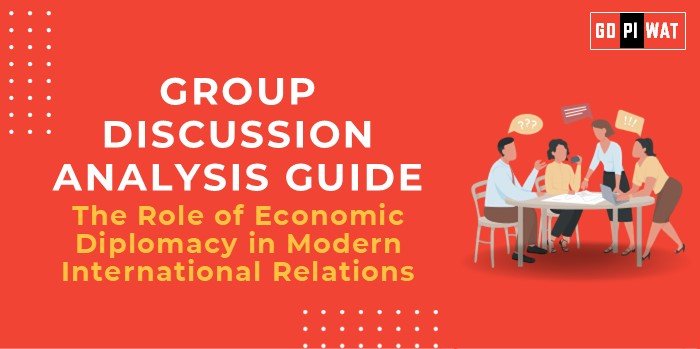📋 Group Discussion Analysis Guide: The Role of Economic Diplomacy in Modern International Relations
🌐 Introduction to the Topic
- 📌 Opening Context: Economic diplomacy has become a cornerstone of modern international relations, influencing global trade policies, investment flows, and bilateral cooperation. As the global economy becomes increasingly interconnected, nations leverage economic diplomacy to assert influence and foster alliances.
- 📖 Topic Background: Historically focused on political agreements, international relations now prioritize economic ties as a key driver of influence. Post-World War II institutions like the IMF and WTO, along with modern frameworks such as Free Trade Agreements (FTAs) and China’s Belt and Road Initiative (BRI), underscore the centrality of economic diplomacy.
📊 Quick Facts and Key Statistics
🌍 Global Trade Value (2023): $32 trillion, underscoring the scale of global economic interdependence (UNCTAD).
💹 FDI Flows: Developing economies received 70% of global FDI inflows in 2023, showing economic diplomacy’s shift toward emerging markets (World Bank).
📜 Economic Agreements: Over 300 FTAs are in force globally, facilitating trade and economic integration (WTO, 2023).
🌏 China’s BRI: Investments exceed $1 trillion across 140 countries, demonstrating economic diplomacy’s reach (BRI Report, 2023).
💹 FDI Flows: Developing economies received 70% of global FDI inflows in 2023, showing economic diplomacy’s shift toward emerging markets (World Bank).
📜 Economic Agreements: Over 300 FTAs are in force globally, facilitating trade and economic integration (WTO, 2023).
🌏 China’s BRI: Investments exceed $1 trillion across 140 countries, demonstrating economic diplomacy’s reach (BRI Report, 2023).
👥 Stakeholders and Their Roles
- 🏛️ Governments: Establish trade policies, negotiate bilateral/multilateral agreements, and promote domestic industries.
- 🌍 International Organizations: WTO, IMF, and World Bank provide platforms for economic cooperation and dispute resolution.
- 📈 Private Sector: Drives investment, innovation, and trade partnerships, shaping diplomatic agendas.
- 🌱 Civil Society and Think Tanks: Influence policy through research and advocacy for sustainable and equitable economic practices.
🏆 Achievements and Challenges
✨ Achievements:
- 🌍 Boosting Global Trade: WTO agreements have reduced tariffs, increasing trade by 170% since 1995.
- 🤝 Regional Integration: Initiatives like ASEAN and the EU exemplify successful economic blocs.
- 📈 Development through Investment: Programs like BRI have improved infrastructure in underdeveloped regions, spurring growth.
⚠️ Challenges:
- ⚔️ Trade Wars: U.S.-China tensions highlight the fragility of economic diplomacy amid protectionism.
- 💰 Debt Diplomacy Concerns: Critics argue initiatives like BRI burden developing nations with unsustainable debt.
- ⚖️ Inequality in Gains: Smaller economies often face asymmetrical benefits in global trade agreements.
🌍 Global Comparisons:
- ✔️ Success: EU’s single market facilitates seamless trade and labor mobility among 27 nations.
- ❌ Challenges: Africa’s reliance on raw exports limits its leverage in global economic diplomacy.
Case Study: India’s withdrawal from RCEP (2019) reflects balancing domestic concerns with regional economic integration goals.
📢 Structured Arguments for Discussion
- ✅ Supporting Stance: “Economic diplomacy fosters mutual growth, creating opportunities for nations to collaborate on trade, investment, and technology transfer.”
- ❌ Opposing Stance: “Economic diplomacy can exacerbate inequalities, leaving smaller nations vulnerable to exploitation and unsustainable practices.”
- ⚖️ Balanced Perspective: “While economic diplomacy drives global development, equitable frameworks and checks against exploitation are essential for sustainable progress.”
🧠 Effective Discussion Approaches
- 🎯 Opening Approaches:
- Data-Based Start: Highlight the $32 trillion trade value to underline economic diplomacy’s scope.
- Historical Perspective: Reference key milestones like Bretton Woods or the EU’s formation.
- 🤝 Counter-Argument Handling:
- Example: “While debt concerns exist in programs like BRI, they’ve also created critical infrastructure in underdeveloped regions, aiding long-term growth.”
📊 Strategic Analysis of Strengths and Weaknesses
- Strengths: Enhances trade, attracts investment, and boosts innovation through collaboration.
- Weaknesses: Vulnerability to protectionism and economic shocks.
- Opportunities: Leveraging digital trade and green economy initiatives.
- Threats: Geopolitical tensions and unequal agreements.
🎓 Connecting with B-School Applications
- 💼 Real-World Applications: Economic diplomacy insights are pivotal for courses on international business, trade policy, and sustainable finance.
- 📚 Sample Interview Questions:
- “How can economic diplomacy address global inequality?”
- “What role does economic diplomacy play in mitigating trade wars?”
- 💡 Insights for Students:
- Case studies on FTAs and global initiatives can offer lessons on negotiation and strategic decision-making.


